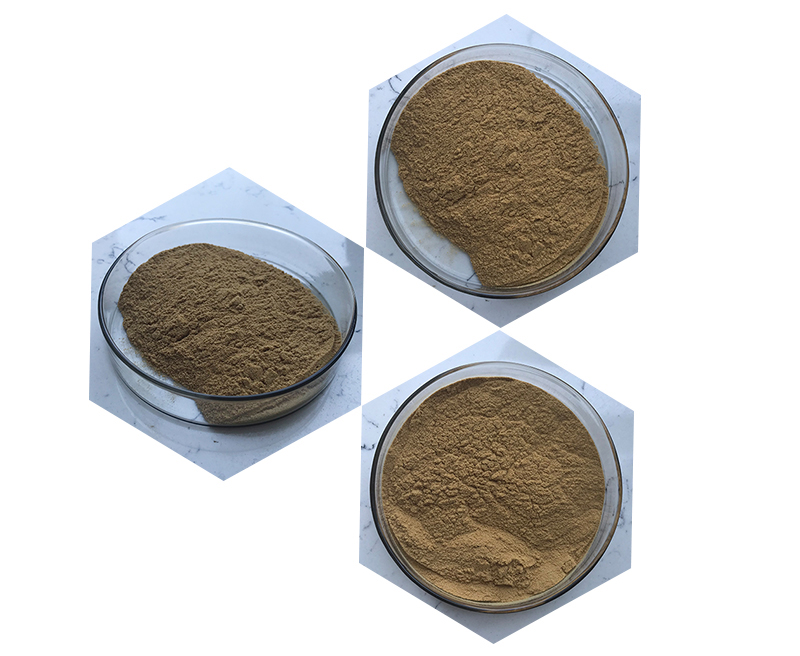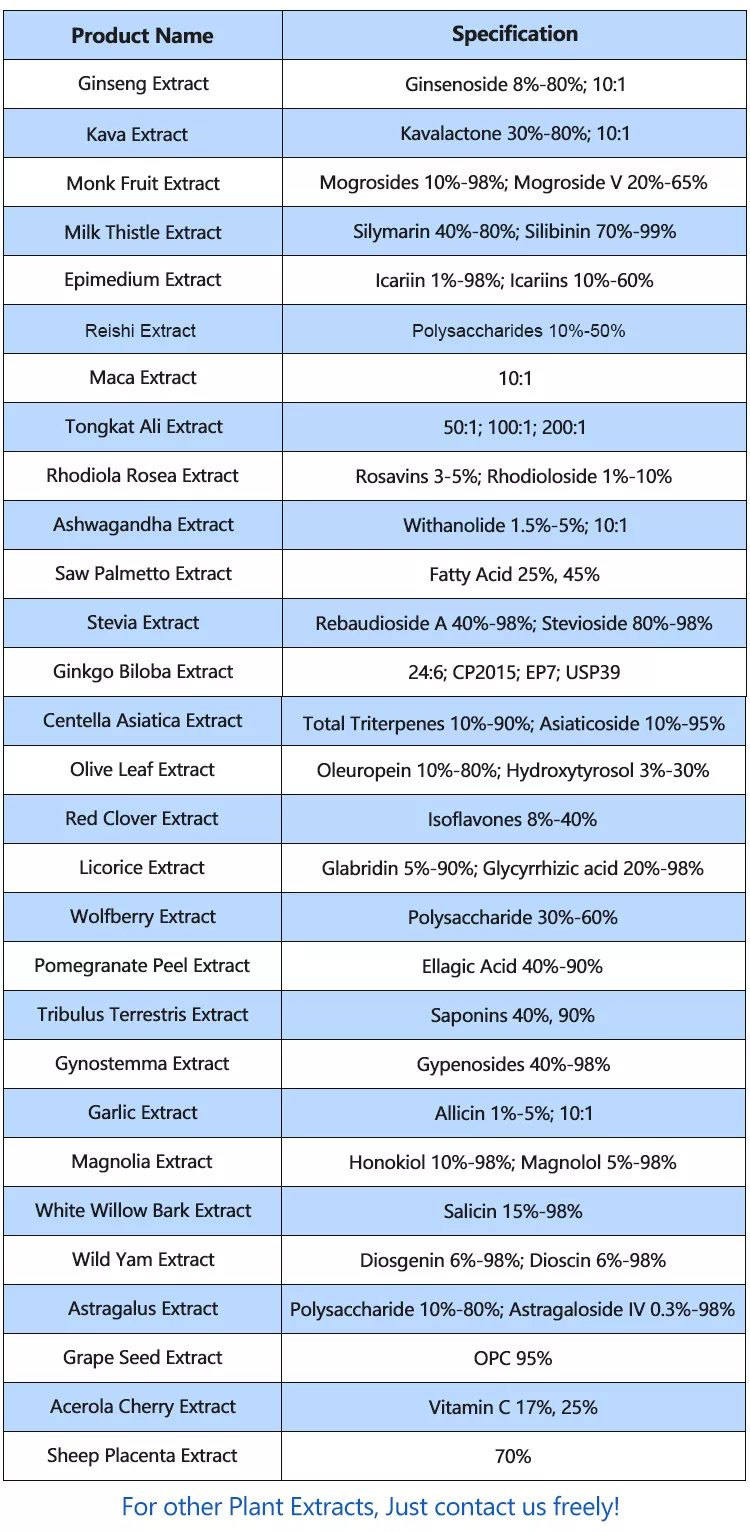Ginseng Extract is derived from the root of the ginseng plant, known for its potential health benefits and traditional use in various cultures, particularly in East Asia. There are different types of ginseng, with the two most common being Asian ginseng (Panax ginseng) and American ginseng (Panax quinquefolius).
Applications of Ginseng Extract
1.Traditional Medicine: Ginseng has been used in traditional medicine systems, such as Traditional Chinese Medicine (TCM) and Korean Medicine, for centuries. It’s believed to have adaptogenic properties, meaning it could help the body adapt to stress and maintain balance. Ginseng powder is often used in tonics, teas, and herbal remedies for its potential to support immune health, boost energy, and enhance overall well-being.

2.Energy and Stamina: Many people use ginseng powder as a natural energy booster. It’s thought to help increase stamina and reduce fatigue. Athletes and individuals with busy lifestyles may use ginseng supplements to improve their endurance and vitality.
3.Cognitive Function: Ginseng is sometimes associated with improved cognitive function. Some studies suggest that ginsenosides, the active compounds in ginseng, might have neuroprotective effects and could potentially enhance memory and concentration. Ginseng Extract or supplements are sometimes used to support cognitive health.
4.Stress and Anxiety: The adaptogenic properties of ginseng may help the body manage stress and reduce feelings of anxiety. It’s believed that ginseng can modulate the body’s stress response and promote a sense of calmness.
5.Blood Sugar Regulation: There is some evidence to suggest that ginseng could help regulate blood sugar levels. It might improve insulin sensitivity and potentially benefit individuals with type 2 diabetes. However, this use should be approached with caution and under the guidance of a healthcare professional.
6.Libido and Sexual Health: In some cultures, Ginseng powder is considered an aphrodisiac and is believed to improve sexual performance and desire. It’s often included in supplements aimed at enhancing sexual health.
7.Immune System Support: Ginseng’s potential immune-boosting properties could make it a valuable addition to the diet, particularly during cold and flu seasons. It’s believed to strengthen the immune system and help the body fight off infections.
8.Anti-Inflammatory Effects: Some studies suggest that Ginseng Extract has anti-inflammatory properties. This could be beneficial for individuals with inflammatory conditions, although more research is needed.
It’s important to note that while ginseng has a long history of use and there is some scientific evidence supporting its potential benefits, more research is needed to fully understand its mechanisms of action and effectiveness. If you’re considering using ginseng powder or supplements, it’s recommended to consult with a healthcare professional, especially if you have any underlying health conditions or are taking medications, as ginseng can interact with certain drugs.
The negative impact of Ginseng Powder
Ginseng Extract is a popular herbal remedy that has been used in traditional medicine for centuries, particularly in East Asian cultures. It is believed to offer various health benefits, including improved energy, cognitive function, and immune system support. Ginseng is available in various forms, including powders, capsules, teas, and extracts. While ginseng is generally considered safe for most people when taken in moderate amounts, there can be potential negative impacts associated with its use, especially if consumed excessively or without proper consideration of individual health conditions.
Insomnia and Restlessness: Ginseng is known for its stimulating effects, which can lead to difficulties in falling asleep or experiencing restlessness. This is particularly true when ginseng is taken in high doses or close to bedtime.
Hypertension (High Blood Pressure): Ginseng can sometimes raise blood pressure due to its stimulatory effects on the cardiovascular system. Individuals with hypertension or heart conditions should exercise caution when using ginseng, and it’s advisable to consult a healthcare professional before doing so.
Digestive Issues: Some people may experience digestive problems, such as upset stomach, diarrhea, or nausea, when consuming ginseng, especially in large amounts or when using it for an extended period.
Allergic Reactions: While rare, allergic reactions to ginseng can occur. Symptoms may include rash, itching, swelling, and difficulty breathing. Individuals with known allergies to plants in the Araliaceae family (such as ivy, carrot, or celery) may be more prone to experiencing allergic reactions to ginseng.

Interactions with Medications: Ginseng Extract can interact with certain medications, including blood thinners, diabetes medications, and immune-suppressing drugs. These interactions can either reduce the effectiveness of the medications or cause unintended side effects. It’s important to discuss ginseng use with a healthcare provider if you are taking any medications.
Hormonal Effects: Some studies suggest that ginseng may have hormonal effects, potentially affecting estrogen and testosterone levels. Pregnant or breastfeeding women, as well as individuals with hormone-related conditions, should use ginseng with caution and under medical supervision.
Skin Reactions: Topical application of ginseng powder or products may lead to skin irritations in some individuals, particularly those with sensitive skin.
Overstimulation and Anxiety: Due to its stimulating properties, excessive consumption of ginseng could lead to increased heart rate, nervousness, and anxiety in some individuals.
Dependency: There is a concern that long-term and excessive use of ginseng could lead to a dependency on its stimulating effects.
It’s important to note that individual reactions to ginseng can vary widely, and what may cause negative effects in one person might not have the same impact on another. If you’re considering using ginseng as a supplement or herbal remedy, it’s advisable to consult a healthcare professional, especially if you have pre-existing health conditions, are taking medications, or are pregnant or breastfeeding. Additionally, be mindful of the dosage and duration of use to minimize the risk of experiencing negative impacts.
